Porto-North-Portugal.com
The best independent guide to Porto
Porto-North-Portugal.com
The best independent guide to Porto
Matosinhos, Portugal; an independent guide for 2026
Matosinhos is both the rugged industrial harbour and the sandy summer playground for the entire city of Porto. While its character is dominated by fishing fleets and shipyard cranes, its true draw lies in its magnificent coastline, home to the best beaches within easy reach of Porto.
The magnificent beach is the Praia de Matosinhos, a vast expanse of golden sand that becomes the city's favourite beach during the summer. On sunny days, it buzzes with energy, drawing Porto residents and visitors alike to its shores for sunbathing and swimming in the chilly Atlantic waters.
Yet, the authentic character of Matosinhos is found in its deep-rooted fishing heritage. Its port is one of the largest in Portugal, and its influence is most deliciously experienced in the streets behind the harbour. Here, the air is filled with the irresistible aroma of freshly grilled fish, served in unassuming restaurants that are considered among the best in the country.
While the town centre itself is largely modern and functional, the true appeal of Matosinhos unfolds along its shoreline. A scenic coastal path connects the main beach to the historic Castelo do Queijo fort and continues towards the elegant Foz district. To the north of the port lies Leça da Palmeira, home to another beautiful beach and the famous Piscina das Marés saltwater pools.
This guide provides everything you need to discover Matosinhos, helping you plan the perfect day trip from Porto.
Highlights of Matosinhos
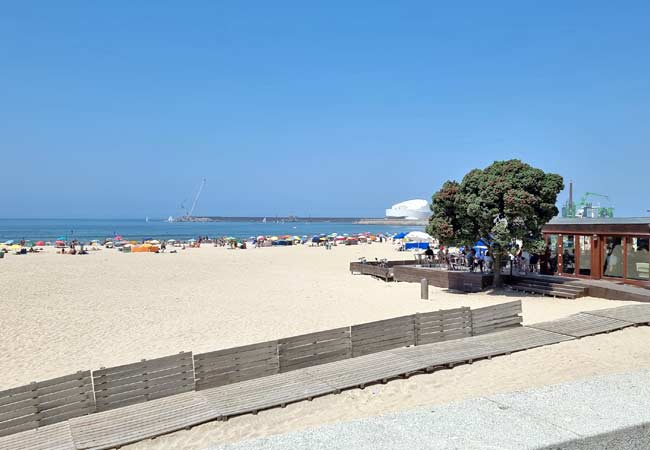
Praia de Matosinhos - Porto’s favourite seaside escape. This vast stretch of golden sand is the city’s go-to destination on a summer's day, with a lively atmosphere and clean seawaters. Its direct metro connection makes it the most accessible, high-quality beach from the city centre.
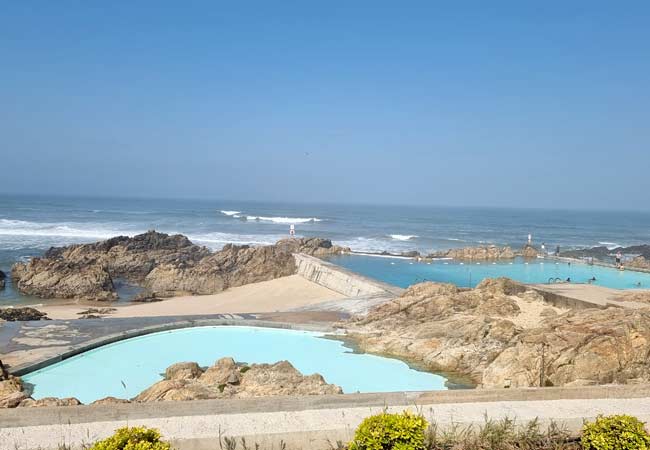
Praia de Leça da Palmeira - A glorious sandy beach on the northern side of the harbour. Quieter and often considered more beautiful than its southern neighbour, Leça da Palmeira offers a pristine stretch of sand backed by cafes.
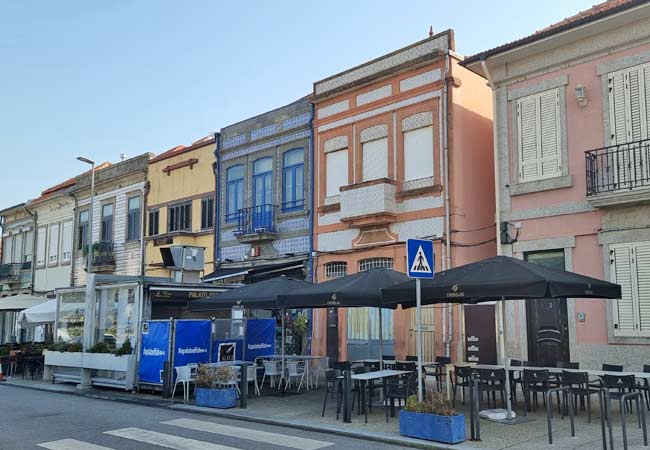
The Seafood Restaurants - Matosinhos is famed for having some of the best seafood in Portugal, brought in daily by its fishing fleet. Head to the streets near the port, especially Rua Heróis de França, where the air is filled with the smell of grilled fish. For a glimpse of the morning's catch, visit the bustling Mercado de Matosinhos.
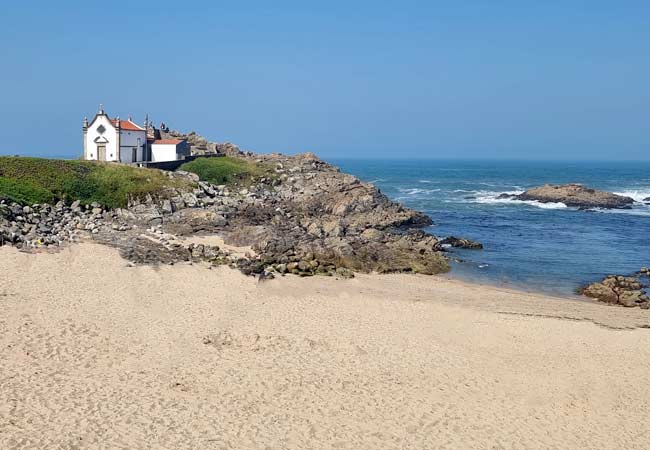
Marginal de Leça da Palmeira - Follow the 'Marginal,' the scenic waterfront promenade that stretches along the Leça da Palmeira coastline. This path offers dramatic ocean views and leads you past the Leça Lighthouse to the striking Casa de Chá da Boa Nova and the Piscina das Marés.
Insight: The Matosinhos region comprises of two towns; Matosinhos to the south of the Rio Leça River and 'Leça da Palmeira' to the north. For visitors, the two towns should be considered as the same.
Why visit Matosinhos?
The sole reason why most visitors head to Matosinhos is for the beach.
Matosinhos is a fantastic destination for a relaxing day on the beach, and is why so many of Porto's residents head here on a hot summer's day.
The Foz district of Porto (2km to the south of Matosinhos) has many small beaches, but these have coarser sands, rocky outcrops and are exposed to strong sea breezes. Matosinhos' beaches have soft sands, clean sea waters and waves that are suitable for surfing - and are generally much better than the beaches in Foz.
Apart from the beach, Matosinhos is rarely considered as a day trip from Porto. This is a shame, as the town has a genuine Portuguese atmosphere and a selection of interesting sights.
A trip to Matosinhos could be combined with the Foz district or the Leça da Palmeira coastline, the section north of Matosinhos.
Related articles: The Foz district
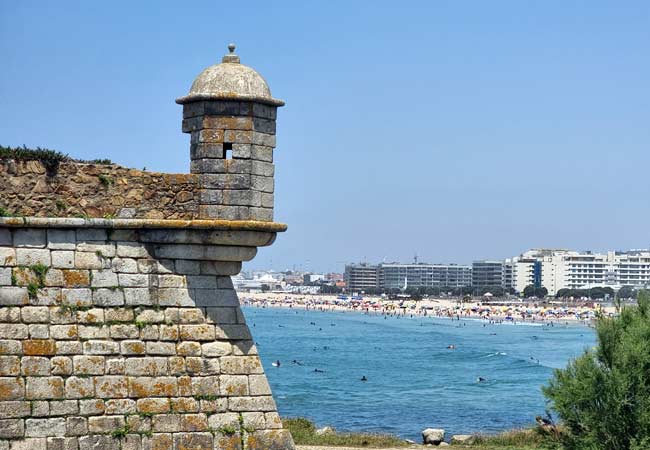
The Castelo do Queijo (Cheese Castle!) stands on the southern side of the Praia de Matosinhos
A trip to Matosinhos
The primary attraction of Matosinhos is the beaches, but there are sufficient sights to fill a half-day of sightseeing.
These sights could include the Bom Jesus de Matosinhos church, the lively market and Castelo do Queijo. If you include a coastal walk along the Leça da Palmeira coastline or the northern section of the Foz district, then you have an enjoyable full day of sightseeing.
One bonus of Matosinhos is that it is very easy to travel to from Porto, by either catching the metro (line 'A') or the regular bus (route 500). This means that Matosinhos can be combined with a day of sightseeing in Porto - often as the Foz district and Matosinhos.
Insight: Matosinhos Sul is the closest metro stop to the beach.
Below is an interactive map of the sights (green markers) and beaches (yellow) of the Matosinhos region. The green line is a suggested tour and covers 15km. (Note: zoom out to see all of the points)
Sights (green markers): 1) Senhor do Padrão (monument) 2) Fish restaurant area 3) Mercado de Matosinhos (market) 4) Bom Jesus de Matosinhos (church) 5) Fort Leça de Palmeira (fort) 6) Piscina das Marés (ocean swimming pool) 7) Farol de Leça (lighthouse) 8) Capela da Boa Nova (chapel) 9) Sea Life (aquarium) 10) Castelo do Queijo (fort) 11) Pérgola da Foz
Beaches (yellow markers): 12) Praia de Matosinhos 13) Praia de Leça da Palmeira 14) Praia do Aterro 15) Praia Azul 16) Praia da Senhora da Boa Nova 17) Praia dos Beijinhos 18) Praia de Leça 19) Praia do Homem do Leme 20) Praia do Molhe 21) Praia de Gondarém 22) Praia dos Ingleses
Sights of Matosinhos

The Piscina das Marés (marker 6 on the map) is a series of swimming pools that are set within a rocky outcrop on the Leça da Palmeira beach. The pools and sunbathing areas are popular with the Portuguese- and the water is always much warmer than the sea!
This is a great area for families, with the entrance fee for a full day ranging from €7-€9/€5-€7 (adult/child) depending on the day and month.

The Mercado Municipal (3) is the daily market with a variety of stalls selling local produce, fresh fish and locally grown fruit and veg. The market building dates from the 1950s and is a protected national monument, with its bold, modernist interior and futuristic curved roof.
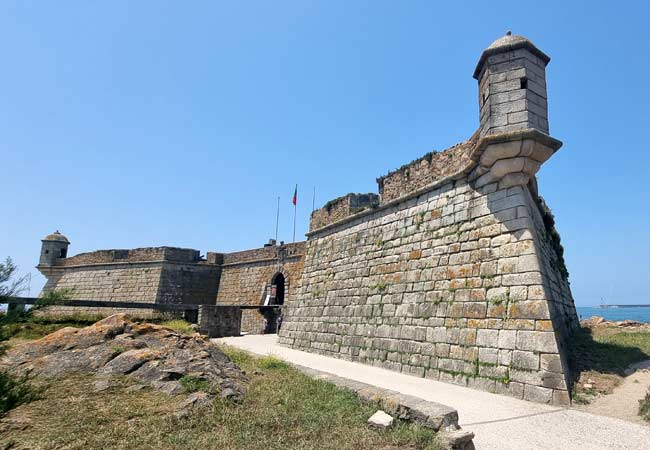
The 17th century Castelo do Queijo (10) is part of a series of defensive forts that guarded the coastline north of Porto. The bizarre name of the fort (Cheese Castle) is due to the granite rock it was constructed upon, which allegedly resembles a cheese.
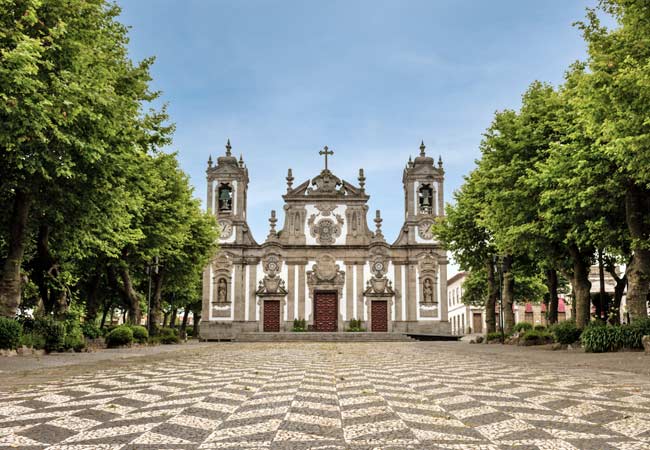
The Bom Jesus de Matosinhos church (4) was historically an important pilgrimage destination as it housed the wooden carving of the 'Bom Jesus de Matosinhos'.
This ancient artefact was the first depiction of Jesus to arrive in Portugal (in 124) and was carved by Nicodemus, a man who knew Jesus and is mentioned in the bible. The 'Bom Jesus de Matosinhos’ carving gives the town of Matosinhos its name.
The Bom Jesus church dates from 1579, but the exterior was re-modelled in an extravagant baroque style in 1743 by the Italian architect Nicolau Nasoni.
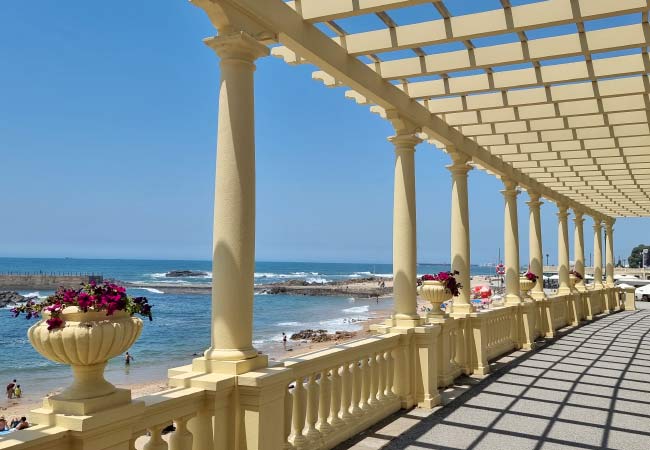
The Pérgola da Foz (11) is part of the pretty waterfront of the Foz district. This is a romantic setting from which you can watch the sunset over the Atlantic Ocean.
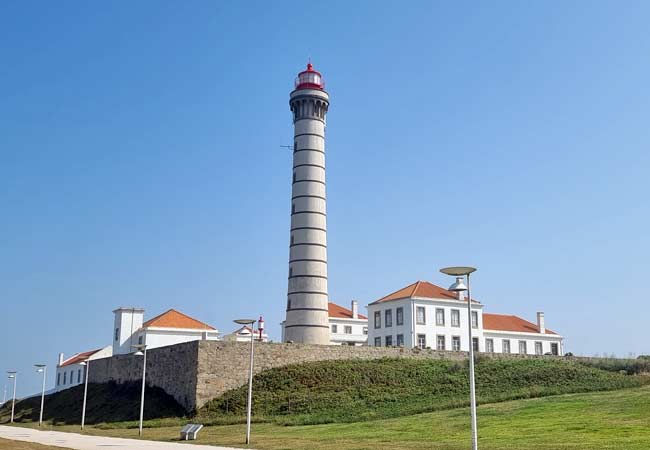
The Farol de Leça (7) was the last major lighthouse to be constructed in Portugal, being finished in 1926. The lighthouse stands at 46m and is the second highest in Portugal.
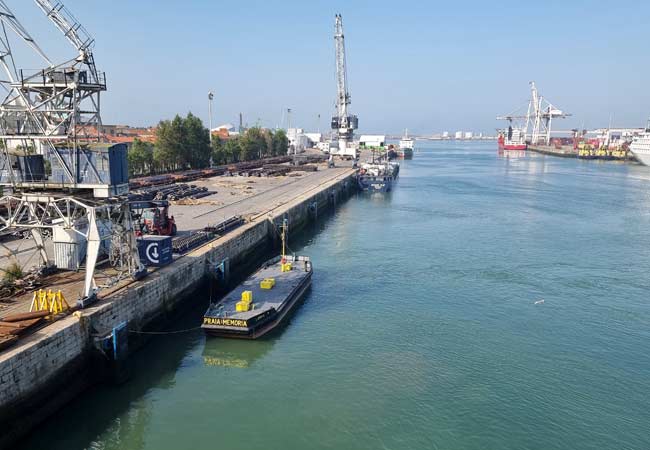
The Ponte móvel de Leça bridge crosses the Rio Leça estuary and the Matosinhos port. This is not the most scenic area of Matosinhos, but is on the route from the metro to the beaches of Leça da Palmeira, such as the Praia de Leça da Palmeira.
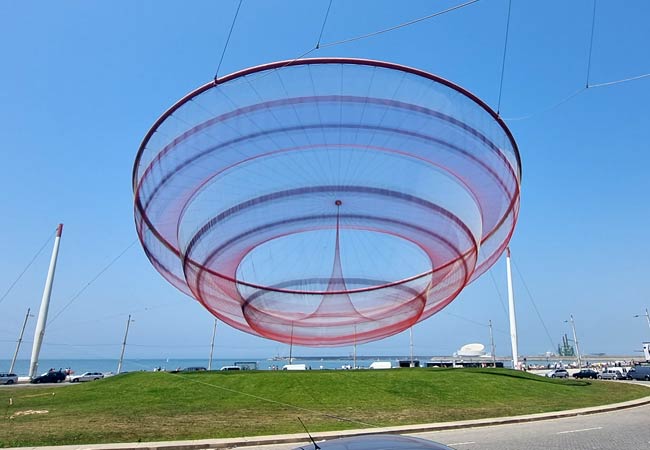
To the south of the Praia de Matosinhos is the 'She Changes' sculpture, a series of impressive red nets that are suspended above the roundabout. This distinctive piece of art was commissioned in 2005 and created by Janet Echelman. The art represents the fishing heritage of Matosinhos, but locals refer to it as the Anémona (the sea anemone).
Travel to Matosinhos
Matosinhos is 8km from central Porto and is served by both bus and metro services.
The 'A' metro line connects Porto to Matosinhos. The journey takes 27 minutes from Trindade (the main metro station in Porto) to Matosinhos Sul (the closest station to the beach). The journey requires a Z3 (3 zone ticket) that costs €1.80. This ticket is charged to the Andante card, which costs €0.60 for the initial purchase.
An alternative is the 500-bus route, which connects central Porto and the Ribeira district with the Foz district and Matosinhos. This is a scenic bus route, as it passes along the Douro River as well as the coastline of the Foz district. The journey takes 30 minutes to reach Matosinhos, and a single ticket purchased on-board costs €2.50 or €1.80 (a Z3 ticket) if you have a pre-loaded Andante card.

The metro to Matosinhos
If you've found our content valuable, we'd welcome your support.
The digital publishing landscape has evolved significantly. As a small independent publisher, we face growing challenges. Search engines increasingly favour paid content over organic results, while AI-generated content often reproduces original work without attribution.
To support our work, please consider bookmarking this page (press Ctrl + D) for quick access. If you find an article helpful, we'd be grateful if you'd share it with friends on social media.
For specific questions, please see our Reddit community at r/LisbonPortugalTravel.
Should you notice any outdated or incorrect information, please contact us at [email protected]
Thank you for helping us continue to provide valuable content in an increasingly challenging digital environment.























